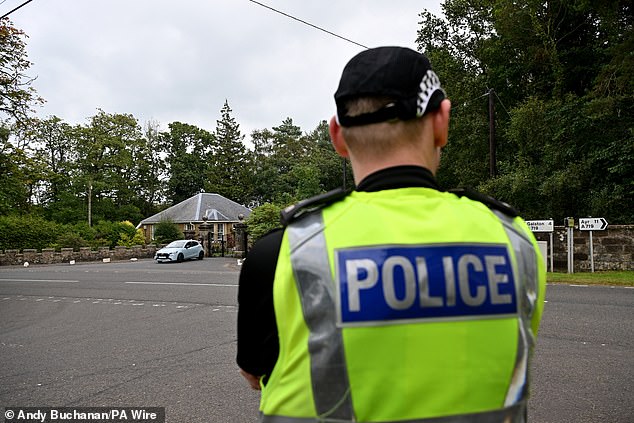Faith in the police has crumbled to a historic low in the last decade, a study has shown.
Just 49% of 32,000 people interviewed for the Crime Survey for England and Wales described their local police as doing a ‘good or excellent job’ in the year to March 2025.
This was down 13 percentage points from 62% a decade ago.
Indeed the percentage of people giving their local force a ‘good or excellent’ rating has gone down every year since a high of 63% in the year ending March 2016.
It is one of several metrics which illustrates a lack of public satisfaction with policing in England and Wales, as hard-up constabularies battle with increased community tensions, reputational damage caused by police officers convicted in high-profile cases, and allegations of a ‘two-tier’ justice system.
Today’s findings, published by the Office for National Statistics using data from its long-running annual crime survey of people aged 16 and over, show only around 11% of residents (one in nine) said they had seen police or a community support officer on foot patrol locally at least once a week.
This is down from 29% (around three in 10) a decade ago, signalling a perceived drop-off in police visibility on the streets – deemed a vital tool to restore confidence and help prevent antisocial behaviour, theft and vehicle crime.
People living in urban areas were more likely to report high police visibility (13%) compared with rural areas (4%), while those aged 65 to 74 (5%) and 75 and over (7%) were less likely to report this compared with other age groups.

Only around 11% of residents said they had seen police or a community support officer on foot patrol locally at least once a week
Around 67% of those surveyed said they had confidence in their local police, a slight increase on the year to March 2024 (65%) but down on the 76% from 10 years ago.
Just over half (51%) of those who had been a victim of crime in the last year and reported it to the police said they were satisfied by their response.
This marked a significant decrease in the 70% satisfaction rating back in 2015, and reached a high of 75% in 2014.
The ONS found differences in victim satisfaction by crime type, ranging from 62% in the latest survey for domestic burglary and 58% for violence, to 41% for bicycle theft and just 26% for theft from the person.
There were also differences by age, with victims aged 16 to 24 less likely to be satisfied with the police response (32%) compared with those aged 45 to 54 (61%), 65 to 74 (59%) and 75 and over (61%).
Around 63% of respondents said they felt the criminal justice system across England and Wales was ‘fair’.
This is down from 66% a decade ago, and a high of 69% in 2018.
The survey was first carried out in 1982 and has been repeated regularly since although some questions have been modified over the years.

The Police Federation, which represents rank and file officers, said demand, danger and pressure on policing has grown
Tiff Lynch, national chair of the Police Federation, said: ‘Regrettably, the figures about the perception of policing over the last 10 years come as no surprise.
‘A decade ago, the Police Federation warned that cuts to police budgets would have far-reaching consequences. Instead of acting upon the warning, the government at the time accused us of crying wolf.
‘Since then, we have seen demand, danger and pressure on policing grow and a workforce increasingly undervalued, underpaid, and under threat.
‘What is urgently needed to help improve public perception is sustained, increased funding to ensure that forces have sufficient funds to properly invest in, and retain, police officers, and the numbers needed to deliver visible, proactive, and reactive, frontline policing.’
The Government said it planned to have 13,000 additional neighbourhood police officers and PCSOs in England and Wales by the end of this parliament.
A Home Office spokesman said: ‘Neighbourhood policing has been decimated since 2010, taking officers away from being out on the beat where they build relationships, trust and safety within communities.
‘That is why, through our Neighbourhood Policing Guarantee, this government is ensuring that they are visible in every area, deterring and preventing crime.’








